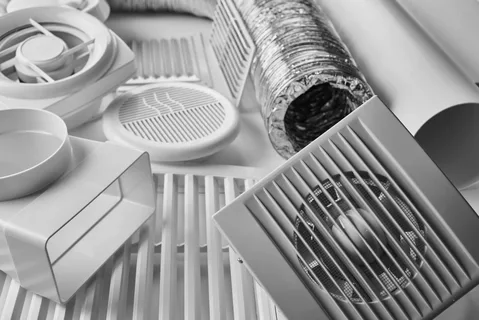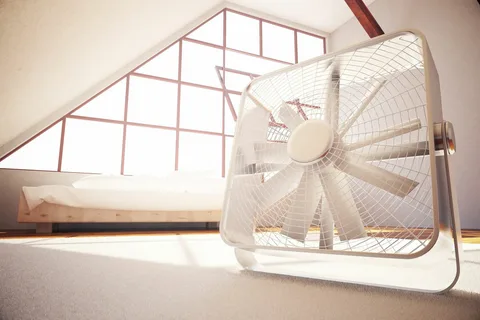Are you thinking about investing in a home ventilator for your residence? If so, you’re making a wise choice! Ventilators are more than just a luxury item; they provide several incredible benefits to make any home more comfortable and safe. In this blog post, we’ll be discussing the most significant benefits that come with having a ventilator. From improved indoor air quality to better temperature regulation, you’ll learn why ventilators are a worthwhile addition to any home.
Improved Indoor Air Quality
Indoor air quality is an essential aspect of any home environment, especially for people with respiratory problems such as allergies or asthma. A ventilator provides a continuous supply of fresh air, reducing the concentration of pollutants, odors, and harmful substances, ensuring the air quality is suitable for breathing.
Without proper ventilation, pollutants such as carbon monoxide, radon, and volatile organic compounds accumulate inside the home. A ventilator ensures the circulation of clean air in every room, eliminating odors, reducing the number of pollutants, and lowering humidity levels. With improved air quality, there is less likelihood of developing respiratory issues, and everyone in the home can breathe easier.
Additionally, a ventilator helps remove excess moisture, reducing the risk of mold growth and damage to the home’s structure. Humidity can accumulate in various rooms, particularly those with high moisture, such as the bathroom, laundry, or kitchen. A ventilator ensures a continuous exchange of stale air for fresh, keeping the air quality healthy, comfortable, and dry.
Reduces Moisture And Mold Growth
Mold can be a real problem in any home. Not only is it unsightly and unpleasant, but it can also have serious health consequences. Mold spores can cause allergies, asthma, and other respiratory problems. Additionally, it can lead to structural damage in your home. A ventilator can be a valuable tool in preventing mold growth.
Moisture is one of the main culprits in mold growth. When there is too much moisture in the air, it creates the perfect environment for mold spores to grow and thrive. By installing a ventilator, you can reduce the humidity in your home and prevent mold growth. The ventilator works by exchanging stale, moist air with fresh, dry air from outside.
A ventilator can be especially helpful in areas of the home that tend to be more humid, such as bathrooms, kitchens, and basements. By reducing moisture levels in these areas, you can prevent mold growth and keep your home healthy and safe.
Enhances Home Comfort
A ventilator can greatly enhance the comfort level of any home by providing a constant flow of fresh air. During the summer months, the ventilator can help cool down a stuffy room and eliminate any stale odors. Similarly, in the winter, it can help maintain the warmth in a room and prevent a musty smell.
In addition, the constant circulation of fresh air can create a relaxing and rejuvenating environment that is beneficial for both physical and mental health. It can help reduce stress levels, promote better sleep, and improve overall well-being.
Moreover, the use of a ventilator can significantly reduce the amount of outdoor noise that enters the home, making it a more peaceful and enjoyable environment to live in. This can be especially beneficial for those who live in urban areas with high levels of noise pollution.
Saves Energy And Reduces Utility Bills
One of the significant benefits of having a ventilator is that it helps save energy and reduces utility bills. This is because ventilators promote the circulation of fresh air in your home, which reduces the need for air conditioning during hot weather. The system pulls in fresh outdoor air and helps distribute it evenly throughout the house, keeping it cooler and fresher.
In winter, the system helps in recirculating heat in the house and reduces the amount of heat that you need to produce to keep your house warm. This means that you won’t need to use as much heating energy, resulting in reduced utility bills. Besides, ventilators operate silently, which means that you won’t be disturbed by the noise from a window air conditioner or fans.
By reducing energy consumption, you will also be reducing your carbon footprint, helping to preserve the environment. Additionally, ventilators extend the lifespan of heating and cooling systems, reducing the need for repairs or replacements, which can be costly.
 Home Ventilator Helps Prevent Carbon Monoxide Poisoning
Home Ventilator Helps Prevent Carbon Monoxide Poisoning
Carbon monoxide is a colorless and odorless gas that can be deadly when inhaled. It is produced when fuel is burned in gas appliances, such as heaters, boilers, stoves, and fireplaces. Inhaling high levels of carbon monoxide can cause symptoms such as headaches, nausea, dizziness, and even death. Therefore, it is important to have a mechanism to prevent the accumulation of carbon monoxide in the home. A home ventilator can help reduce the risk of carbon monoxide poisoning by increasing the circulation of fresh air and reducing the concentration of carbon monoxide in the home.
A ventilator works by exchanging the indoor air with fresh air from outside, which helps to dilute and remove carbon monoxide, along with other pollutants, from the home. The system can be installed to work continuously or on a timer, which means you don’t have to worry about manually opening windows to improve indoor air quality.
Reduces Pet Dander And Allergens
For those who suffer from allergies to pet dander, owning a pet can be a challenge. But with a ventilator, it becomes much easier to manage. By removing airborne pet dander and other allergens from your home, you can greatly reduce your allergy symptoms and improve your overall quality of life.
Pet dander can linger in the air for hours after your pet has left the room, making it difficult to completely rid your home of these allergens. A ventilator helps by continually cycling fresh air throughout your home, reducing the concentration of pet dander and other allergens in the air.
This is especially important for those who have pets that shed heavily, as the hair and dander from these pets can quickly accumulate and cause respiratory problems. With a ventilator, you can greatly reduce the amount of hair and dander in your home and breathe easier as a result.
Reduces Cooking Odors And Smoke
Cooking can bring wonderful aromas and delicious flavors to any home, but it can also leave behind unwanted smells and smoke. A ventilator can significantly reduce cooking odors and smoke, making your home a more comfortable place to live in.
A ventilator works by drawing out stale and polluted indoor air, and replacing it with fresh outdoor air. When it comes to cooking, the ventilator helps to capture and remove the odors and smoke that can be produced during the cooking process.
By having a ventilator, you can also say goodbye to lingering cooking smells, and hello to fresh air. This is especially beneficial when entertaining guests or when cooking strong-smelling foods like fish or garlic.
Moreover, having a ventilator can help prevent indoor air pollution that can be caused by cooking fumes. These fumes can hurt your respiratory health, and a ventilator can help protect you and your family from these potential hazards.
Helps Control Asthma And Respiratory Problems
Ventilators can be a lifesaver for those who suffer from respiratory problems such as asthma and allergies. They help maintain a clean and fresh indoor environment by filtering out dust, pollen, and other allergens that can cause asthma and respiratory problems.
A ventilator is equipped with a high-efficiency particulate air (HEPA) filter that traps even the smallest particles, making the air safe to breathe for those with respiratory issues. Moreover, these filters can be replaced or cleaned periodically, which keeps them functioning at their optimal level.
Aside from cleaning the air, a ventilator can help regulate humidity levels. By reducing the moisture levels in the air, it reduces the growth of mold and bacteria, which can cause respiratory issues and trigger allergies. This is particularly beneficial for people who live in areas with high humidity levels or those who suffer from seasonal allergies.
Faqs
- What is a home ventilator and how does it work?
A home-ventilator is a system that helps circulate fresh air into your home while exhausting stale indoor air. It pulls air in from outside and pushes it throughout the home while removing indoor air pollutants and moisture.
- Can a ventilator be installed in any home?
Yes, ventilators can be installed in almost any home, regardless of their size or structure. A professional contractor can help determine the best location and size for your specific needs.
- Will a ventilator make my home noisy?
No, most ventilators are designed to operate quietly. However, some may produce a low humming sound. A professional contractor can help choose a model that fits your home and your noise tolerance level.
Conclusion
After discussing the various benefits of ventilators, it is clear that they are a worthwhile addition to any home. By improving indoor air quality, reducing moisture and mold growth, enhancing home comfort, saving energy and reducing utility bills, helping to prevent carbon monoxide poisoning, reducing pet dander and allergens, reducing cooking odors and smoke, and helping to control asthma and respiratory problems, ventilators offer a multitude of benefits.
While there may be some initial costs associated with installing a ventilator, the long-term benefits make it a sound investment for any homeowner. Not only do ventilators improve the health and well-being of those who live in the home, but they also save money on energy bills and reduce the need for costly repairs due to moisture and mold damage.



